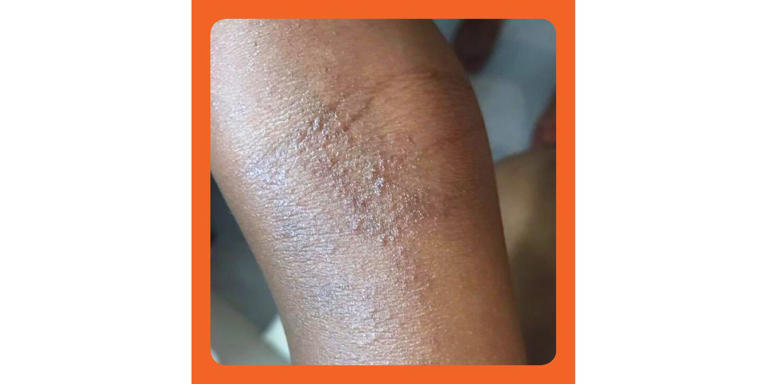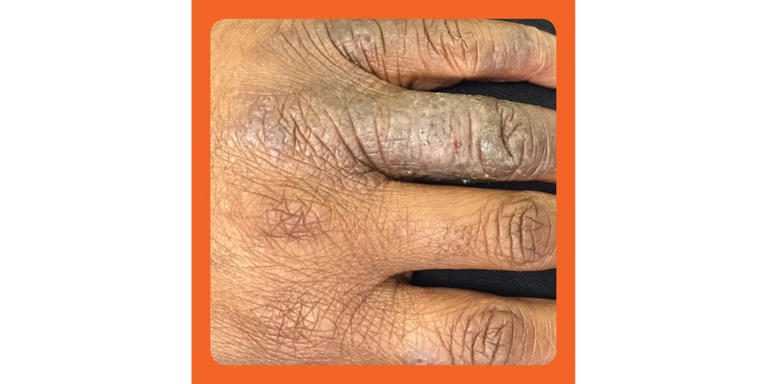All you need to know about treating eczema on Black skin












All you need to know about treating eczema on Black skin
If you have eczema, you know it can be quite the challenge to control. It seems like flare-ups can magically appear overnight, but take a whole lot longer to get under control. Not to mention, some eczema can be minimal and itchy, while other cases can develop into large, flakey and dry patches.
And if you have melanin-rich skin, you may find this skin condition to be even more troublesome than others, for a few reasons. First of all, Black skin is notoriously underrepresented in dermatological research. It's estimated that only 4.5 percent of medical textbooks show conditions on dark skin, according to a study published in Social Science & Medicine. Those inequities in medical literature can make it especially difficult to then recognise skin concerns like eczema on your own skin and then advocate for yourself to get an accurate diagnosis.
That’s why we decided to get the scoop on eczema from a few board-certified dermatologists, to find out how it appears on Black skin, and how it can be diagnosed and treated. Keep reading to learn more about this skin condition and how it affects the Black community.
What is eczema in the first place?
'Eczema is a sort of umbrella term that includes a few itchy skin rashes, but it most commonly refers to the condition known as atopic dermatitis,' says Laura Scott, MD, board-certified dermatologist and associate director, skin of colour division at UM Frost Dermatology. It's a chronic condition, she continues, where an overactive immune system leads to an impaired skin barrier that can cause dry, itchy skin, and even skin infections.
What makes this skin condition even more complicated is that it’s not the same across the board. 'There are actually multiple forms of eczema ranging in severity and appearance,' Caroline Robinson, MD, Chicago-based board-certified dermatologist and founder of Tone Dermatology, says. It can appear as early as infancy and usually shows up on the face, elbow and knees. From there, it can eventually spread to other parts of the body.
So what causes eczema?
Basically, the cause of eczema is somewhat unknown. 'Some people are born with genetic tendency to develop eczema. However, it is not completely understood why some people develop a more severe form than others or when it develops,' says Dr. Robinson.
Dr. Scott agrees that the cause is a combination of genetics and environment. Of course in certain seasons, if the temperatures drop where you live, dry skin will be more prevalent.
Does eczema look different on Black skin?
Like we stated before, not all eczema is the same, but there are certain symptoms that are common. 'In general, eczema rashes are very itchy, dry patches on the skin,' says Dr. Scott. On lighter skin, they often appear red, but on darker skin they can appear purplish or brown.

But not every dry patch that appears on the skin is actually eczema. Dr. Robinson notes that if the patches aren’t itchy, the diagnosis of eczema is a less likely one. So if you find that itch is consistent in your dry patches, it’s best to see a dermatologist as soon as possible.
Other symptoms Dr. Robinson notes are scaling, crusting, scratches, thickening of the skin, and redness. But she does note that redness can be a challenge to detect on dark skin, and has the potential to lead to underdiagnosis or misdiagnosis.

What does eczema look like on light Brown skin?
'In lighter complexions, redness may be more easily visualised. However, it can present similarly to black skin. eczema can often be discoloured even after the rash goes away. Patches of light skin (hypopigmentation) or dark skin (hyperpigmentation) can occur in areas of previous rash. This can improve with time and sun protection,' reveals Dr. Whitney Latin of U.S. Dermatology Partners Pasadena.
If you have melanin-rich skin, are you more likely to get eczema?
Studies have shown that Black skin doesn’t retain as much water as white skin, which means that Black people are more likely to have dry skin. The causes have to do with both the composition of the skin itself, and the environment some Black people are living in. 'Black skin has increased trans-epidermal water loss and decreased ceramide levels, that can lead to more significant dryness. Also, eczema rates are higher in urban settings, where there are higher levels of environmental pollutants,' Dr. Scott says.
Some research also posits that people of African American, Hispanic and even Asian descent have worse conditions of atopic dermatitis or eczema than other ethnicities, according to Massachusetts-based board-certified dermatologist, Dr. Karen Kagha, MD.
Dr. Robinson agrees that Black patients are more likely to develop eczema, and she says that their skin also tends to be more resistant to treatment. 'There is a complex mix of factors, including genetics, skin barrier function, and environment that seem to play a role in these differences.'
How can you treat eczema in Black skin?
There are a few ways experts treat eczema, but it depends on the severity of the case. 'Moisturisers are one of the most important treatments,' Dr. Scott says. 'We need to restore lost water and seal it in, so thick creams or ointments are the backbone to any eczema treatment and preventing flare ups.' Consider over-the-counter options like Vanicream Moisturising Cream or CeraVe Moisturising Cream.
marks can be treated with a prescription retinoid, for example, and should fade with time.
The bottom line: Eczema may be more common on Black skin, but is often misdiagnosed. If you believe you might have eczema, schedule an appointment with a dermatologist to discuss the best next steps.
What helps eczema on Black skin?
As well as topical creams and moisturisers, Dr Latin says, 'I will often recommend a “soak and smear” which entails soaking in a plain water bath for 10 minutes, then without drying the skin completely, immediately apply a thick ointment (ie Petroleum jelly, Aquaphor) over all affected areas of the body. This effectively hydrates the skin and locks in the moisture.'
'Regular baths should be short at 10 minutes or less and should use lukewarm water. Extremely hot or cold baths can irritate the skin. Opt for soap-free cleansers to avoid raising the pH of your skin,' she adds.
'To avoid irritation, I recommend loose fitting clothing, cotton clothes, towels, and sheets that are washed with fragrance-free and dye-free detergents,' says Dr Latin.
What skincare ingredients help with eczema on Black skin?
Dr Latin suggests the following to help with eczema on black skin
- Soap-free cleansers help maintain pH balance of the skin. Soap can often raise the pH of skin leading to excessive dryness.
- Hyaluronic Acid is a humectant and helps to retain moisture in the skin
- Ceramides are natural lipids which helps support your skin barrier
- Niacinamide is a form of Vitamin B3 which has anti-inflammatory benefits and helps improve moisture retention in the skin.
- Colloidal oatmeal can act as a skin protectant to help relieve dryness and itch.
Articles-Latest
- 8 common mistakes that could be making your dry lips worse
- Dermatologist's insight on shower frequency without harming skin
- ‘Making Black More Beautiful’: Black Women and the Cosmetics Industry in the Post-Civil Rights Era
- A damaged skin barrier can leave you dry, itchy or oily. So, how do you fix it?
- What is collagen and why is it so popular in the beauty industry?
- Skin icing's not just for summer – this cryotherapy technique will get you party season ready
- How much sunscreen should you use and how often do you need to apply it?
- Are AHAs Safe?
- EXFOLIANTS - Cosmetics Unmasked
- ASTHMA - Toxic Beauty
- PHOTOSENSITIVITY - Toxic Beauty
- How to Tighten Your Loose Skin After Weight Loss
- Everything You Need To Know Before Getting A Septum Piercing
- What you should know about treating rosacea in darker skin tones
- Shampoos and Conditioners Designed to Soothe Dry, Itchy Scalps
- 3 things an expert wants you to know before getting filler
- Dissolving filler: everything you need to know
- How thread lifts differ to facelifts – and filler injections
- People are using face tape to minimise wrinkles, but does it work? After asking a plastic surgeon, I tried it for myself
- Reality of Black beauty influencing - making foundation with eyeshadow and unequal pay
Cosmetic ingredients
LOGIN
Who's On Line
We have 56 guests and no members online
Articles-Most Read
- Home
- Leucidal
- White Bees Wax
- Cosmetic Preservatives A-Z
- Caprylyl Glycol
- Cosmetics Unmasked - How Safe Are Colorants?
- Cosmetics Unmasked - Choosing Ingredients
- Cosmetics Unmasked - Colorants And Fragrances
- EcoSilk
- Toxic Beauty - Who's Looking At Cosmetics?
- Cosmetics Unmasked - Fragrances
- Microbes and Cosmetics
- Chemicals Lingering In The Environment
- Microbes and Safety Standards
- Toxic Beauty - Hazardous To Your Health
- Potassium Sorbate
- Yellow Bees Wax
- Synthetics In Cosmetics - The Industry Fights Back
- Fresh Goat's Milk Soap
- Active Ingredients
- What's Happening in the USA - Cosmetic Regulations - Toxic Beauty
- Cosmetics Unmasked - Listing Cosmetics
- Natural Waxes A-Z
- Toxic Beauty - Cocktails and Low Doses
- Natural Butters A-Z


